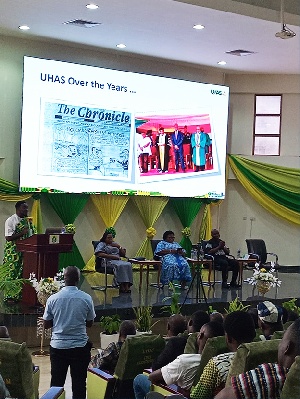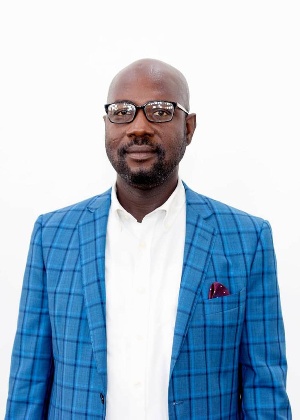- Home - News
- Elections 2024
- News Archive
- Crime & Punishment
- Politics
- Regional
- Editorial
- Health
- Ghanaians Abroad
- Tabloid
- Africa
- Religion
- Photo Archives
- Press Release
General News of Monday, 2 June 2025
Source: www.ghanawebbers.com
UHAS holds Atta Mills Leadership Lecture Series
The John Evans Atta Mills Lecture Series
The Ninth JEAM Leadership Lecture Series took place at the University of Health and Allied Sciences (UHAS) in Ho. This event honors the late President Professor John Evans Atta Mills, who founded UHAS. The theme was “Advancing Quality Health Systems in Ghana Amidst Global Disruptions.”
The lecture aims to inspire students and activate mentorship systems. It helps develop the capacity of students and health workers to reflect on their core values.
Dr. Sodzi Sodzi-Tettey, CEO of the National Vaccine Institute, was this year’s guest speaker. He described President Mills as an academic icon and a political leader. He noted that Mills established UHAS in 2011 despite initial skepticism.
Dr. Sodzi-Tettey praised UHAS for graduating top-notch health professionals. He emphasized that President Mills believed in empowering youth through education.
He stated that UHAS has achieved its purpose, echoing President Mahama's words: “The dream of Prof. Atta Mills has been actualized.” Dr. Sodzi-Tettey urged African leaders to emulate humble leaders like Captain Ibrahim Traore from Burkina Faso.
He discussed global disruptions affecting health financing systems. By May 9th, 176,818 jobs were lost globally due to these disruptions.
Dr. Sodzi-Tettey mentioned that significant research on improving health services has been halted. Ghana is set to exit the Global Alliance for Vaccine Initiative (GAVI) by 2030 due to its lower middle-income status.
He highlighted that Ghana needs $51 million annually for vaccine purchases under the Expanded Programme of Immunisation (EPI). Global institutions like WHO will also face challenges supporting diseases such as HIV, TB, and Malaria.
An international Health Regulatory Group evaluated Ghana’s pandemic preparedness in 2025 with local experts. They identified strengths like comprehensive national policies and robust coordination mechanisms.
However, weaknesses included inconsistent policy enforcement and human resource shortages. Limited laboratory capacity and weak data systems further hindered effective responses.
Dr. Sodzi-Tettey noted that despite challenges, Ghana has built a solid foundation for health security. The country has developed strategic plans covering key areas like antimicrobial resistance and immunization programs.
Yet, he warned about barriers hindering full implementation of International Health Regulations (IHR). There are critical deficits in specialized personnel across various sectors.
Laboratory capacities remain limited at lower levels with insufficient facilities for priority pathogens. Weak data systems compromise disease surveillance efforts significantly.
He called for urgent action to address these weaknesses in response to global disruptions affecting health systems in Ghana.
Prof Lydia Aziato, Vice Chancellor of UHAS, remarked on the university's progress aligning with President Mills' vision. She emphasized setting new standards both nationally and internationally.
The forum was attended by notable figures including Prof Kodzo Gavua and Prof Fred Newton Binkah along with students and academics.











